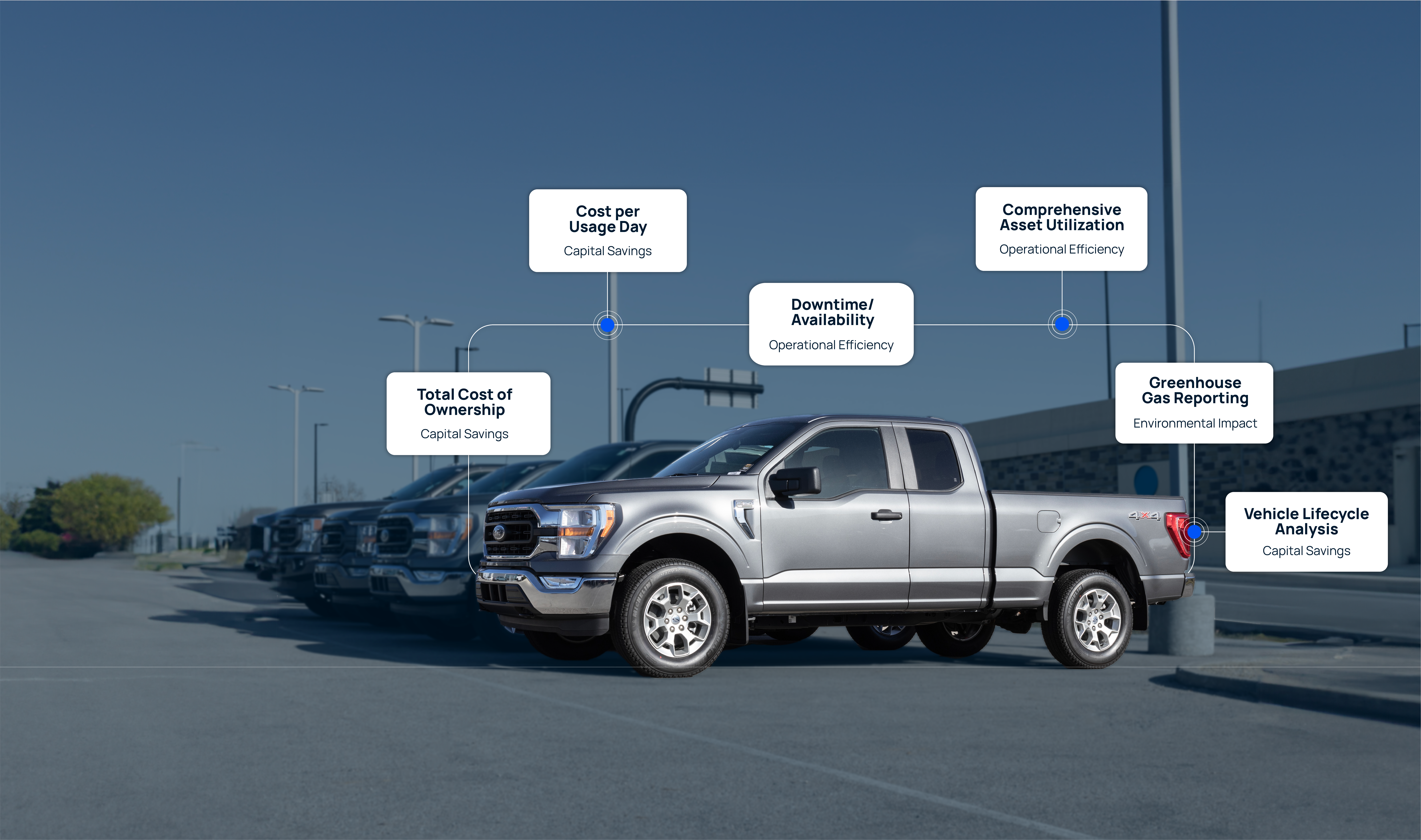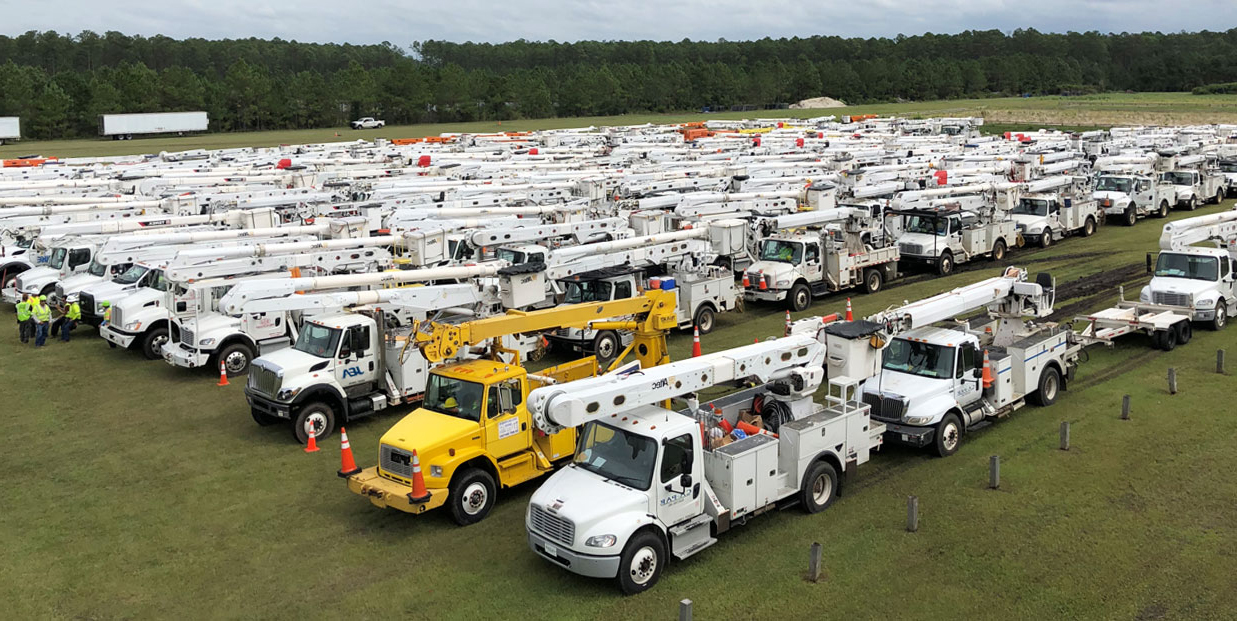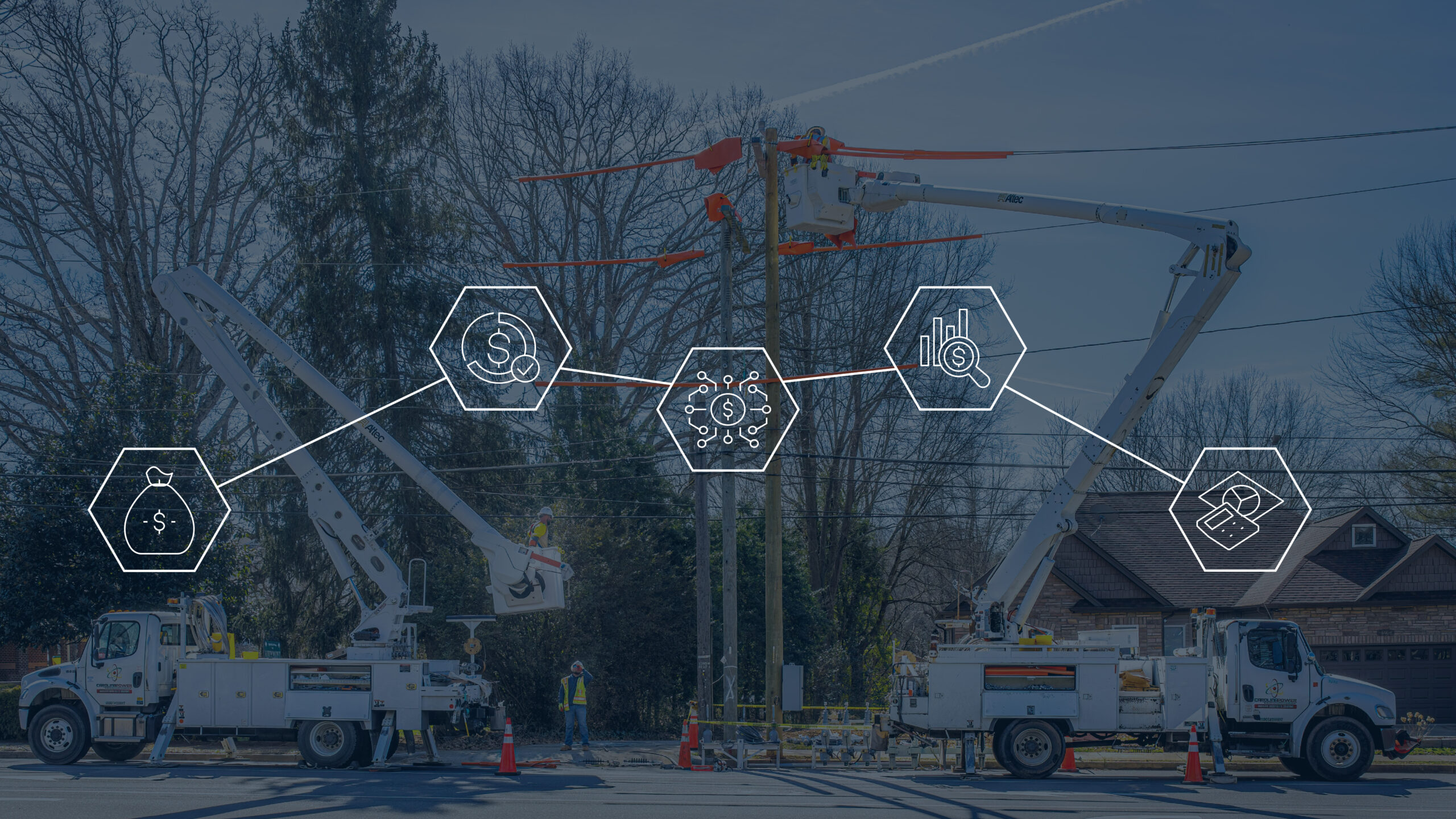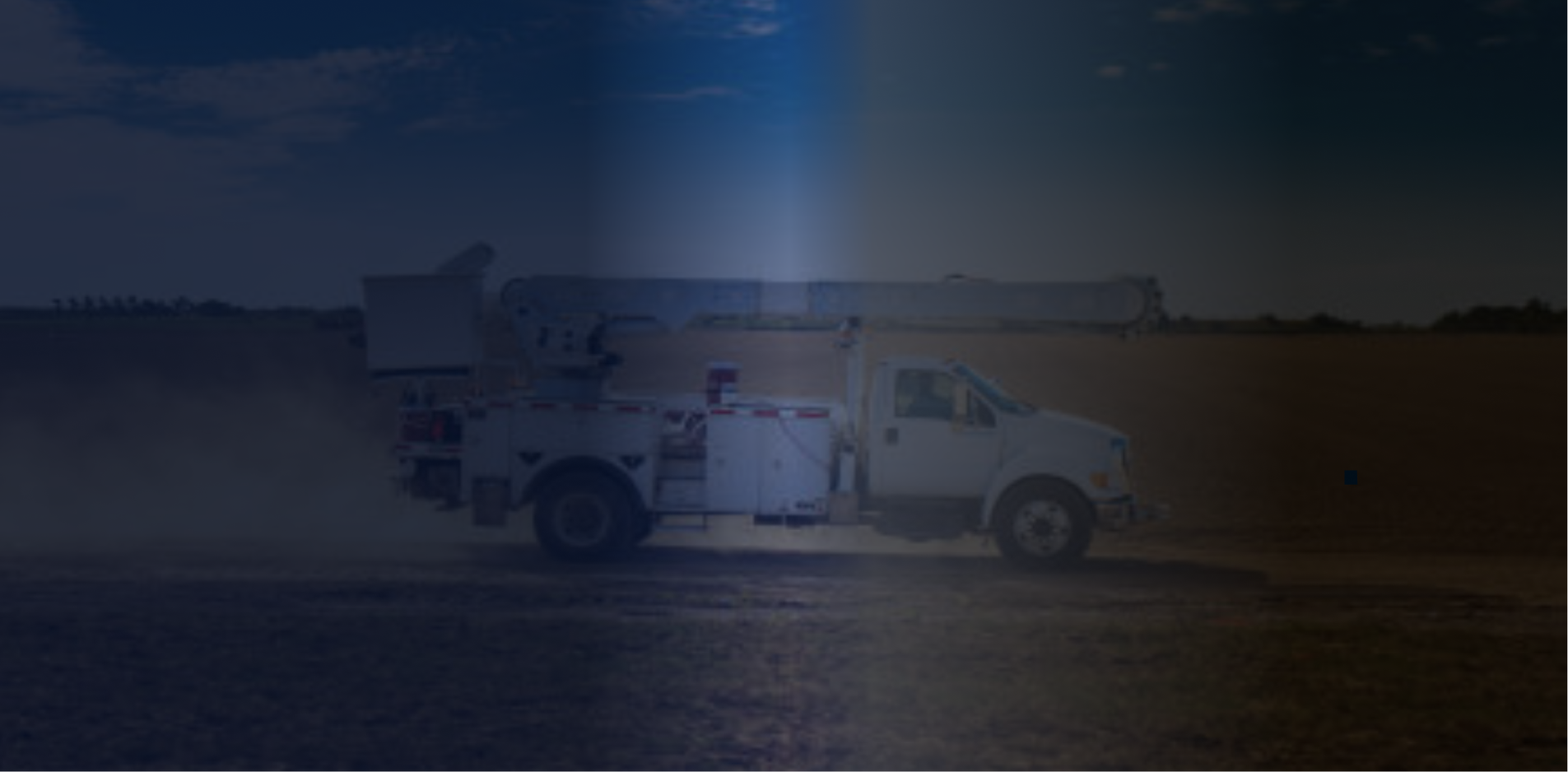
What Data Trends Should You Expect to See in 2021?
This week on Fleet FYIs, I’m speaking again with Lanelle Duke about the upcoming trends in data that are expected for 2021 and the latter months of 2020. We’re breaking down how COVID-19 is affecting the fleet industry, and how utilization, smarter spending and a shift in mindset might be what’s next for the industry.
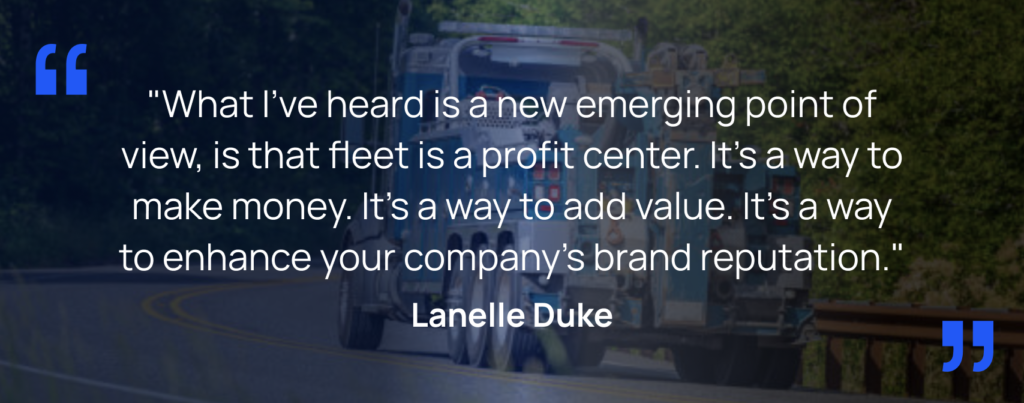
Here’s a quick summary of my conversation with Lanelle:
No matter the industry, the initial projections for 2020 have certainly changed. But will that carry over into 2021? Here’s some of the main talking points from this week’s episode.
- Fleets are digitizing their data…but what does that mean for the industry?
- People are starting to understand their data more – and this can mean many changes in strategy or key performance metrics.
- Data literacy
and - Having confidence in your data and how that can impact your decision-making process.
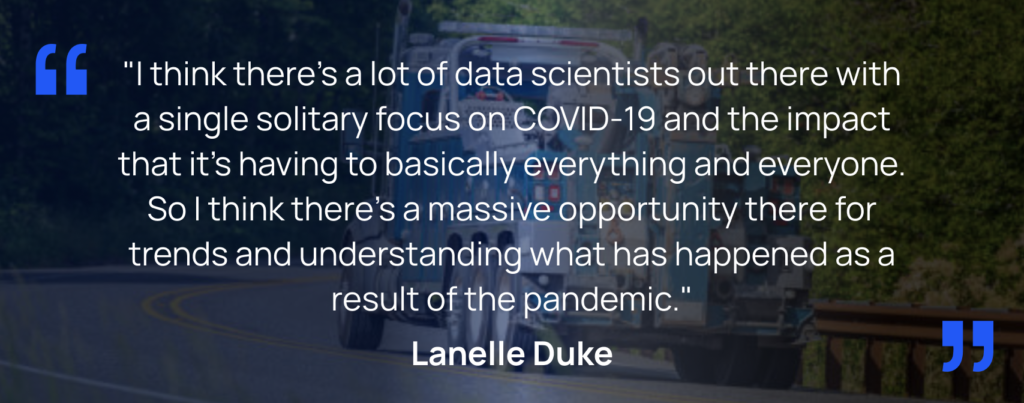
Lanelle’s most memorable quotes:
“I think there’s a lot of data scientists out there with a single solitary focus on COVID-19 and the impact that it’s having to basically everything and everyone. So I think there’s a massive opportunity there for trends and understanding what has happened as a result of the pandemic.”
“What I’ve heard is a new emerging point of view, is that fleet is a profit center. It’s a way to make money. It’s a way to add value. It’s a way to enhance your company’s brand reputation.”
Lanelle Duke, Upcoming Trends in Data? Here’s What You Should Expect to See in 2021 w/ Lanelle Duke | Utilimarc Fleet FYIs Podcast
Episode five was full of interesting insights. If you’d like to have a listen, it’s available to stream on all major platforms – but if reading is more your style, take a look at this episode’s transcript below:
Upcoming Trends in Data? Here’s What You Should Expect to See in 2021 w/ Lanelle Duke | Fleet FYIs: Episode 5
Gretchen Reese (00:04):
Hey there. Gretchen here. Welcome to Fleet FYIs, the weekly podcast by Utilimarc that makes fleet management strategy smarter by bringing to you nearly two decades worth of data insights, industry hot topics, and expert analysts together in conversation. Our aim is to help you better understand your data and your key metrics by hosting candid conversations with some of the industry’s finest.
Gretchen Reese (00:27):
But before we begin, if this is your first time listening to our podcast, thanks for hitting the play button. I’m so glad you decided to come along for the ride and have a listen. Once you’ve finished today’s episode, if you could take a few minutes to leave us a review, we’d really appreciate it. Give us a rating, tell us what you liked or perhaps what you didn’t, or you can leave us a comment or a question about what we’ve covered today. Also, if you have a topic that you’d love for us to cover but we haven’t touched on yet, let us know. We’d be happy to go over it in detail in a later episode. Sound good? All right. Let’s get back to the show.
Gretchen Reese (01:06):
Hey, everyone, and welcome back to another episode of Fleet FYIs. This week, we’re digging into a super hot topic. And what is it that’s fresh on the minds of many, you might ask? Trends and data. That’s what. Oh dear. I wish I were funnier. Maybe we should get a joke writer in here because my repertoire is limited to jokes on a candy wrapper. But my lack of funniness aside, I think that this’ll be a really interesting topic to get into today.
Gretchen Reese (01:34):
We’re all getting used to this quote, unquote, new normal, what with the pandemic, and we’re seeing new utilization rates and remote working, and many other things basically in a domino effect as a result. But my question is, how will what we’re seeing this year affect the trends in data that we’re seeing from the end of 2020 and into 2021? Will it be changed drastically from what was predicted last year? I mean, one can assume because no one really thought that this was going to happen, but I’m curious, will it mirror what we saw in the economic crisis of 2007 to 2009?
Gretchen Reese (02:10):
If you remember last week, which, if you haven’t listened to last week’s episode, you absolutely should, just make sure it’s after this one, we were somewhat beginning to touch on data trends with Lanelle Duke, who is part of the Utilimarc product management team. And we were chatting all about how machine learning and artificial intelligence could affect the fleet industry as it’s in a relatively unique position seeing how so many industries globally were early adopters of this AI techniques. And now, the fleet industry is getting its feet wet more and more so pretty much with every passing year.
Gretchen Reese (02:42):
And because we got such a positive response last week, I thought that Lanelle would be the perfect person to get back into the nitty gritty when we’re talking about potential upcoming trends and data for the end of this year and into next.
Gretchen Reese (02:53):
For those of you that don’t know, like I said, Lanelle is on our product management team here at Utilimarc, but she’s also got a pretty extensive background in the field, with a deep dive into data and analytics for the last few years, and prior to which, she was in the marketing industry. So if we’ve got someone that’s keeping their finger on the pulse of trends, she’s our gal. Let’s dig in.
Gretchen Reese (03:14):
Hi, Lanelle. Welcome back to the podcast. I’m so glad you were able to come back this week for another episode.
Lanelle Duke (03:19):
Thanks, Gretchen. Glad to be here.
Gretchen Reese (03:21):
So, Lanelle, the last time we spoke, we were talking about machine learning and AI and where the fleet industry is starting to go with that. And I really think that goes hand in hand with what we’re talking about today, which is trends in data. So I’d like to jump into it just right off the deep end and basically just talk about the trends that you’re seeing. And we all know that fleets are digitizing their data and they’re digitizing their management strategy, which is great in so many respects, but I’m curious to know if there’s any trends that you’ve been noticing either on the product side or even just in the industry in general.
Lanelle Duke (04:00):
I think the big thing that I’m seeing is that I think people understand or are our beginning beginning to gain an understanding that data is really important. And I guess that’s not really a new thing, but I think a lot of organizations, usually their strategy or their key initiatives are built around other facets of their business, and I really think that there should be a key focus on data and how a company leverages data and using data.
Lanelle Duke (04:32):
And I think like short term, there’s ways that you can incorporate data and data storytelling into the kind of decisions that you’re making and that you’re advocating for. I think the long game is where sometimes people, they don’t want to invest in it or they just think, “Oh, I’ll think about that next year.” But I really feel that organizations, they really need to think about their longterm strategy and they need to invest in it now. They need to get started. Just start. Even just start small and chip away at it. Because five years from now, 10 years from now, data is going to be the key to everything. And so businesses need to get going on it and make a plan and start working the plan.
Gretchen Reese (05:20):
Right. One thing that I’ve noticed just in the last few years is that so many people are saying that you should be paying attention to your data. And it’s kind of shocking when you look at how many people perhaps that don’t. It’s almost as though some people need to be convinced that they need to understand their data, almost looking at it from a data literacy perspective. And I think that it’s had quite a bit of focus in the last few years. And for those that don’t know, data literacy essentially means you need to really understand where your data is being used, how it’s being used and why it’s important. Why would you say, in your opinion, why would you say that that’s had such a focus in the last few years, coming at it from maybe a long-term trend perspective?
Lanelle Duke (06:10):
I think just the reason that it’s really coming to the forefront now is because there’s so much more data now than there used to be. Just the internet of things and the ability to store data inexpensively and being able to actually do something with it, I think are all new things, relatively new things that we’re seeing. So I think that’s made the awareness level of people be able to really see that and how important that is.
Lanelle Duke (06:44):
And then, so I mean, I think of that as kind of more the high level of it, but then I also think of it as more of a single feeling almost. Like I’ve talked to fleet managers who they don’t have a system to work with their data and they’ve got their boss or a senior executive standing over their shoulder while they’re sitting at their desk asking them a question, and they’re sitting at their computer and they’re in Excel or they’re trying to dig through a lot of data using their mouth and clicking their keyboard. And they’ve got this person standing over them waiting for an answer. And that’s the worst feeling in the world as a fleet professional to be in that situation. It’s not fun. Like if someone asks you a question, you want to be able to answer them immediately, right? And you want to just be able to tell them. You don’t want them to have to wait 15 minutes while you’re trying to find it in your computer.
Lanelle Duke (07:55):
So then you take that to the whole continuum of the highest, which is the whole trends and long-term strategy.
Gretchen Reese (08:11):
Right. And I think having confidence in your data is also a big part of data literacy, that perhaps if you’re looking at it from just a standard definition, confidence in your data might not come up. But, like you said, when you have someone that’s standing over your shoulder expecting an answer, they’re not going to leave until they get it. So being able to not only understand your data and understand the trends you’re seeing in it, but also having confidence that you understand your data enough to deliver a solid answer. Even if perhaps it might not be the one that they’re looking for, but if you have confidence behind your answer, you at least have the ability to say like, “This is why I’m coming to the conclusion I am.” Perhaps it’s they need to fix something or process needs to be changed, but you have that ability because you understand and you have confidence in your data behind it.
Lanelle Duke (09:06):
Yeah. I absolutely agree with that. You really need to have confidence. It’s not a great feeling to make decisions based on data, especially some that might have far-reaching impacts, and then find out at some point later that the data you was using was wrong or inaccurate. So yeah, I think everyone’s really looking for accuracy so that they can trust the data and use it to confidently make decisions or advocate for a position with their senior executive, or even talking to a driver about some sort of trend they’re noticing with the driver about how they’re driving the vehicle or fueling the vehicle or things like that. So when you’re trying to take action with your data, you want to know it’s right.
Gretchen Reese (09:59):
Absolutely. And I want to get into something perhaps a little bit more relevant for fleets now, and perhaps this is prompted by COVID-19, like many trends are at the moment, but we’re seeing so many fleets nationwide that are seemingly to be, or they’re seeming to be overly concerned with driver safety. Now, would you say that this has to do with perhaps the ease of transmission of the virus or more of a focus on reducing speeding events or potential incidents that could create unforeseen expenses? Almost like safety versus potential reduction of cost.
Lanelle Duke (10:42):
I think a fleet manager, they have to have both those things in their line of sight. And I think a fleet professional, they pride themselves on creating a safe environment and an effective environment for a driver to do their job.
Lanelle Duke (11:00):
So I think they’re all about the safety aspect of it and making sure the vehicle’s running okay and meeting the driver’s needs in that way from a safety perspective, and even even from COVID-19, where you’re seeing a large influx of rentals because you don’t want people sharing a cab. So there’s a lot of shuffling there that fleet managers have had to do during this crisis to help driver safety and everything that goes along with a driver doing their job in this kind of environment.
Lanelle Duke (11:38):
So I think a fleet manager, foremost in their top of mind is driver safety. And when I’ve talked to them in the past and I’ve asked them what keeps them up at night, and I’m like, “What’s the big thing on your mind? What are you losing sleep over?” and most of them say, “I lose sleep thinking about accidents,” right? They don’t want their drivers to get into accidents. They don’t want to put people at risk like that. So I think that kind of safety part is a big component of it, for sure. I’d say that’s number one.
Lanelle Duke (12:14):
But I also think that one of the big things that a fleet manager is in charge of is controlling costs, and that’s a big piece of it too. And they really need to be in charge of that and have a plan. And I think budgets get smaller and smaller, I think, in the private sector, but also, you see it a lot in the state government space or the municipalities. Like everyone’s getting squeezed and fleet is one of those places where people look. So I think it’s both.
Gretchen Reese (12:51):
And do you think that COVID-19 is propagating any other data trends for the last part of 2020 and into 2021 aside from safety or accident prevention or maybe even cost management?
Lanelle Duke (13:04):
I think there’s a lot of data scientists out there with a single solitary focus on COVID-19 and the impact that it’s having to basically everything and everyone. So I think there’s a massive opportunity there for trends and understanding what has happened as a result of the pandemic.
Lanelle Duke (13:32):
So I was thinking, maybe it’s a couple of weeks ago I was thinking, if I was a data scientist right now, I mean, of course, like no one’s having fun with COVID, I’m not saying that, but if I was a data scientist right now, that would be very interesting to be able to get ahold of data and see what the impacts are.
Lanelle Duke (13:53):
So I do think that COVID-19 is generating a lot of interesting analysis and trends. And I think over the next months and year or two, we’re going to see that. We’re going to see studies published and we’re going to learn a lot. I think it’s going to be really interesting.
Gretchen Reese (14:12):
Absolutely. And for those of you that haven’t listened to the second episode of Fleet FYIs with Paul Milner, we were talking about with COVID-19 and the effects on budgets and how perhaps it might take the fleet industry two years to recover in terms of the amount of newly purchased vehicles. But he was also touching on the fact that, just mirroring this crisis, it could also be paralleled to what we experienced in 2007 to 2009 during the Great Recession.
Gretchen Reese (14:43):
And, I mean, hopefully this is not going to be the case, but if there’s any other future crises that might pop up that are of this scale or of the scale in 2007 to 2009, what people are learning from COVID now or repeating from what they might have learned during the Great Recession, it might be something that you could apply in the future that, for a data scientist, this could be like, I hate to say it, but kid in the candy store because it gives them the answers that either they previously didn’t have, or it proves a theory, or, it helps them with potentially preventative technology, or, if they’re looking at preventative patterns, how can they perhaps, if they’re anticipating a crisis, try and create almost a buffer zone from what we’ve experienced now.
Lanelle Duke (15:30):
Yeah. I think definitely we will learn from the past and we can apply that to the future, for sure.
Gretchen Reese (15:37):
So with everything that we’re gathering from COVID, and the previous recession and such like that, I want to know if this is something that perhaps fleet management software or even just fleet software in general, do you think that this might be something, if we’re talking about trends and data and the need to predict new trends, do you think that software might be something that we could use to predict trends for the future? I mean, where do you think all of that fits in?
Lanelle Duke (16:07):
I think fleet management software in general is a very powerful tool for a fleet team. There’s a lot of capabilities in there that allows them to perform their jobs easier on a daily basis. There’s a lot of data and insights that get generated out of a platform like that. So I think just day to day right now, there’s a lot that is going on there and has the potential to go on there.
Lanelle Duke (16:36):
I think for future trends, I think where you’re going to see the amazing insights are going to be when you take that data from that fleet management system and you combine it with other data sets that you’re interested in and see what you can glean from that, from integrating the data sets together.
Gretchen Reese (17:01):
And one thing that I’ve been seeing quite a bit, and I’ve seen a massive rise in this just one small thing, well, it’s not small, but you know what I mean, I’ve seen a massive rise in demand for comprehensive data analytics, which is kind of exciting because it’s not just data analytics within the fleet industry, it’s worldwide. I mean, people want to understand their data and they want to understand the numbers. And it’s not just been in this past year, even though people have been really kind of needling in and really looking at their numbers to see what they can cut or what they can use to help them out in the next few years. But it’s rising in numbers, probably over the last five, but specifically for this and next year.
Gretchen Reese (17:43):
What would you say, in your opinion, do you think the biggest benefits of this shift towards collecting and organizing data could have for fleets in general?
Lanelle Duke (17:57):
I think the biggest benefit that you’ll see is being able to answer questions that, before, you weren’t able to. So for example, just a few examples that are pretty common in the industry, which is predictive maintenance, accident prevention, and fleet right-sizing. Those are some big things that fleet managers would really like to get their arms around. And I think the data collecting and organizing it and then doing something with it to apply to one of those three scenarios, I think will be really helpful and I think that is one of the biggest benefits that we’re going to see.
Lanelle Duke (18:48):
Another thing I think is really interesting that I’ve heard probably the past year or so, which I’ve thought a lot about and I’ve heard from some of my fleet manager friends is there’s a shift within the fleet manager community, which is there’s this widely held belief out there that fleet is an expense, right? I feel like that’s what everyone, “Well, yes, of course. It is an expense. It’s my biggest expense,” or that’s what people think. But what I’ve heard is a new emerging point of view, is that fleet is a profit center. It’s a way to make money. It’s a way to add value. It’s a way to enhance your company’s brand reputation. And you had a former podcast featuring Erin Gilchrist-Rugg where I think she brought up that same thing.
Lanelle Duke (19:43):
So I think that’s a really interesting, an interesting thought, that it’s not a cost, it’s a profit center. And I absolutely believe that’s true, but I also think it’s going to be an uphill climb to convince a senior executive or a director of procurement that that’s the case. And I think that’s where data comes into play. You need to have the data, you need to have done the pilot tests, and you need to wrap that into a compelling story to allow you to advocate for your point of view and change people’s minds on that kind of concept. And I think, as a fleet manager, at a high level, at a strategic level, that’s a very important part of your job.
Gretchen Reese (20:31):
And I love that you brought up Erin’s episode because I was honestly thinking of that when you were saying, “Oh, it really helps with the brand reputation and it can be a profit center.” Because you’re right, and so was she. Fleet can be, like she said, fleets a lot of money, and no one’s hiding from that, right? Because there’s so many expenses that involve keeping and maintaining a fleet of vehicles, however, the benefits for having a successfully run and properly managed fleet, you have the ability to enhance your brand’s reputation, like you said, but then you can also get better brand recognition.
Gretchen Reese (21:10):
And the benefits, I mean, I wouldn’t say they’re endless, but there’s so many of them that people don’t necessarily think about. They just almost kind of see it as a cost sink, just because yes, it is a big part of the expense reports and it will always be that, however, it’s kind of like that mind frame, how you look at it, because it can be a really powerful tool. It’s just not always thought of that way.
Lanelle Duke (21:32):
Yeah, I absolutely agree with that. And I just think there’s so many spokes to that concept, that, I mean, I won’t go into it here, but there’s some fleet managers out there that are really thinking about their fleet asset in non-traditional ways that are very cutting edge and very cool. And I think over the next few years, we’re going to start seeing through the industry some of those kinds of things being implemented. And I think it’s really neat.
Gretchen Reese (22:04):
Absolutely. So when we’re speaking of comprehensive analytics and then fleets being a powerful tool as a whole, what do you think the trend of perhaps this, we can call it a mindset shift, what do you think this trend will have in terms of an effect for fleet budgets for the upcoming year? I mean, I know they’ll probably be strained because of COVID, but aside from that, if people are reforming their mindset surrounding how powerful a tool fleet can be, do you think that will have any lasting effect?
Lanelle Duke (22:34):
I absolutely do. And I think that’s one of the main points to do it, is your budget is going to get cut, cut, cut if people think you’re just an expense, but if they see you as a profit center and you can demonstrate that, and I know fleet managers who can because they have strategies for doing exactly that, and if you can paint that picture and build that story, then your budget is not going to get cut. It’s probably going to get increased, and then you’re going to be able to do even more with your fleet assets and put new programs in place. Yeah, I just think it’s a very exciting time and fleet budgets are always under fire, but this could be a way to turn that around and change that.
Gretchen Reese (23:29):
And so tell me then, how, for example, would like a fleet management software tool or like a business intelligence platform, basically a single point where you can organize and understand your data, how could that help you set goals or execute upon them for maybe next or the years following next?
Lanelle Duke (23:50):
Well, I think an integrated platform, a BI platform that combines lots of different data sets, and it’s not just about combining the data, it’s about doing something with it, something interesting with it, something helpful with it after. And I think that’s where that kind of a platform is helpful on so many levels. But I think when you’re talking about your budget or changing minds or advocating for your position or making decisions, that being able to actually use that data easily to paint a picture of what you’re trying to do is really important.
Lanelle Duke (24:37):
So you not only need the data, you need to do something with it that your audience can understand and get behind. And I think when you’re talking to a senior executive… Like a fleet manager and a lot of us who’ve been in the industry for a long time, we live fleet data. We know all about fleet. Like that’s all we think about all day. And sometimes into the night, we’re thinking about fleet, fleet, fleet, but your CFO or your CEO, they don’t have that kind of single-minded point of views. So you really need to be able to use data to educate them slowly. You don’t want to blast them all upfront in your first session with them, but you want to, like you talk about data literacy, and kind of a different take on that is you want to bring people along, right?
Lanelle Duke (25:32):
You need to help them understand and you have to start small and kind of build it up over time. And then eventually, they get to a point where they’re really savvy with data and they really understand it. So I think we have our own hat that we wear and tweet and we know things inside and out, but you really need to take into account the audience that you’re talking to and trying to win over, and what’s the best way to do that. And it’s probably more of a slow, steady approach starting simple and small to explain the data and what it means and why it’s important and how to read it, and then build up from there.
Gretchen Reese (26:13):
Oh, absolutely. And when you’re talking about the fact that a lot of people that have been in fleet for a long time, they live, eat, and breathe fleet and fleet data, what would you say is a trend that you would love to see in regards to fleet data or a fleet management software for the upcoming year?
Lanelle Duke (26:32):
Well, I don’t know if it’ll be for the upcoming year because I think this is something that’s going to take longer than that, but one of the trends that I’m interested in as a product manager, or just in general for fleet, is being smarter in how to control costs. Like that’s really on fleet managers’ minds of controlling costs, running efficiently, all that kind of thing, and some of the big things like we’ve talked about in this episode of right-sizing your fleet, preventing accidents, the big ways to save money. And as a product manager, those are some key topics that I’m really interested in and I would really like to, and we will be, working on solutions to be able to do just that for my customers and from the industry.
Gretchen Reese (27:24):
Yeah. That’s awesome. So Lanelle, is there anything that we haven’t spoken on yet that you’d like to add before we wrap this episode up?
Lanelle Duke (27:32):
I think just one thing. I think that I’m really interested in the notion of the fleet is not an expense, it’s a profit center. And if anyone’s interested in talking to me more on and on that conversation point, I’d really like to hear their point of view or their take on that. So I guess you can reach me on LinkedIn and I would really like to hear people’s point of view on that.
Gretchen Reese (28:02):
Yeah, absolutely. And I just want to thank you for sharing your LinkedIn profile because I think there’s going to be quite a few people that’ll probably want to follow up with you after this episode to chat with you about it. I mean, it’s an interesting topic and I think that conversations surrounding fleet as a profit center rather than a cost sink, it’ll be really insightful and I’ll be looking forward to any future conversations about that too, just to see how they kind of develop and keep going.
Lanelle Duke (28:28):
Yeah. Me as well. So thank you so much for having me on today. I had a great time talking to you about this.
Gretchen Reese (28:33):
Yeah. Absolutely. Thanks again for taking the time out of your day to jump on the podcast again, and I’m sure we’ll probably talk to you in the future.
Lanelle Duke (28:41):
I hope so.
Gretchen Reese (28:42):
All right, bye Lanelle.
Gretchen Reese (28:44):
So I think that my favorite part about this conversation had to do with the perception of a fleet within an organization. And going on from that, hopefully either currently or shortly in the future, I’d love to see the shift in mindset from a fleet being a massive expense and potentially a cost sink to a real profit center.
Gretchen Reese (29:03):
Now, I’m not beating around the bush because I know that fleets will always be one of the largest costs associated with an organization. I’m not even going to pretend that they’re not. I mean, they are expensive, but this shift in mindset is one of the biggest trends I think that can come out of the pandemic, alongside perhaps an increase in utilization, and also a massive focus on driver safety. Now, that’s not just on the road, but that’s in the cab too. And as a bit of a germaphobe, self-admitted, I can totally get behind that one.
Gretchen Reese (29:34):
However, I’d love to get your opinion. What do you think will be the largest or perhaps most valuable or most noticeable trend to come out of the pandemic and this year alone? Are you expecting a trend to really take off into 2021? I really want to know. So send me an email, leave us a review with your thoughts, or share this episode on your LinkedIn or other social media accounts with the hashtag #UtilimarcFleetFYIs so that I can see what you think and perhaps we can chat about it.
Gretchen Reese (30:02):
Aside from that, if you’re looking for more content surrounding some of the trends that we were speaking about today, I’d highly suggest that you have a listen to our previous episode with Lanelle, which talks about machine learning and artificial intelligence, or you can have a listen to the episode talking all about budget cuts and all things capital with Paul Milner. There’s a little bit of trends in there too, so it’s a nice tie-in. There’s some pretty great insights there and I think that you’ll probably enjoy them.
Gretchen Reese (30:26):
But as for me, that’s all for this week. And until I speak to you again, you can always find us at our website, utilimarc.com, which is spelled out U-T-I-L-I-M-A-R-C.com, for more blog content and this episode’s show notes if you’d like to read a little bit about the show. You can also find us on LinkedIn, Facebook, and Instagram at the handle @Utilimarc, but that’s all for this week. I’ll catch you later.
If you or someone you know is interested in being a guest on Fleet FYIs, please email our content manager with your request.
